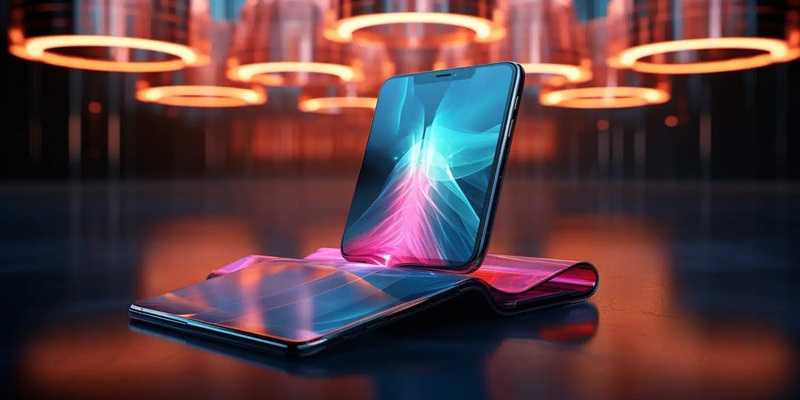How Foldable Screens Are Shaping the Future of Smartphones?
Author: Elison
As you journey through changing mobile technology, foldable screens can transform your smartphone life. By 2025, foldable screens will redefine your device interaction, collapsing traditional categories between smartphones and tablets. With additional real estate for a larger screen and no sacrifice in handheld form, new dimensions for multitasking and consumption become a reality, opening new dimensions for work and leisure activity when mobile.
The Rise of Foldable Screens in Smartphones
A Game-Changing Innovation
Foldables have emerged as a breakthrough development in smartphone technology. With flexible screens, smartphones can become full-fledged tablets and fold into thin phones, providing unprecedented adaptability for use cases and capabilities. Tech leaders such as Samsung, Huawei, and Motorola have supported such technology, shipping high-tech foldable smartphones that compete with conventional mobile technology.
Increased Productivity and Entertainment
Increased real estate for a foldable smartphone screen opens doors for new dimensions in multitasking and consumption scenarios. Consumers can switch between a single-hand form factor and a form in a tablet for gaming, streaming, and productivity operations, providing modularity and usability not seen in conventional smartphones and tablets.
Overcoming Technical Challenges
Although foldables reveal exciting new dimensions, companies have encountered meaningful technical concerns in delivering them. Securing long-lasting durability in a flexible screen, creating strong hinges, and supporting software for various forms have become meaningful concerns for companies.
Redefining Smartphone and Tablet Design with Foldable Technology

Foldable screens change smartphone and tablet thinking forever. With no longer a rigid, two-dimensional shape, such computers fold and unfold in a new shape at will. With such a flexible shape, smartphone portability and tablet real estate for one device have become a reality. With fold and unfold, doors have swung open for multitasking, consuming, and creatively producing in new and exciting forms.
Innovative User Interfaces
Folded technology opens doors to new and exciting user interfaces and experiences. Unfolds allow immersive view experiences for video, gaming, and productivity software. In fold, such tools become pocketable and discreet. Some allow even partial unfolding, opening new form factors for specific experiences such as typing and video chatting. All such malleability is challenging app developers to rethink app development, optimizing for form factors and switching between them.
Key Benefits of Foldable Screens for Users

Increased Productivity
The added real estate of a larger, foldable shape enables multitask capabilities in full swing for real multitaskers. Users can have several windows for programs, move and drop between windows, and have a desktop opportunity in a handheld device. All such added real estate in a device reduces added productivity for professionals in motion, allowing them to work smarter and not have to sacrifice between handheld form factors and productivity form factors.
Immersive View Experience
Foldable screens elevate the mobile entertainment experience to new heights. These devices offer a cinematic viewing experience for movies and TV shows when unfolded. The larger display also enhances gaming, providing a more immersive environment for mobile gamers. Additionally, e-book enthusiasts can enjoy a more natural reading experience with more extensive, book-like displays that closely mimic physical pages.
The Impact of Foldable Screens on the Future of Mobile Devices
Revolutionizing Form Factors
Foldable screens are transforming the landscape of mobile devices. These flexible displays enable smartphones and tablets to change their form factors, offering users the best of both worlds. When unfolded, they deliver a tablet-like experience with ample screen space. When folded, they become compact and easy to carry. This versatility is changing how we interact with our devices, blurring the lines between smartphones and tablets.
Enhancing Productivity and Multitasking
The larger screens of foldable devices are a game-changer for productivity. Users can comfortably view multiple apps side-by-side, making multitasking more efficient. For instance, one could attend a video call while taking notes or browsing reference materials. This capability is particularly valuable for professionals and students who require seamless workflows.
Driving Innovation in App Development
Foldable screens are inspiring a new wave of app development. Developers are rethinking user interfaces to maximize the different screen sizes and orientations. This has resulted in more intuitive and adaptable apps seamlessly transitioning between folded and unfolded states. Consequently, users enjoy more prosperous and more immersive digital interactions across various applications, including gaming and content creation.
Emerging Trends and Innovations in Foldable Screen Technology

Advancements in Flexible Display Materials
Cutting-edge research in foldable display materials paves the way for even thinner and stronger foldable screens. Experts introduce new polymer compounds and thin-film glass compositions that can withstand refolds and folds many times with no loss in performance. Advances will remove durability and longevity concerns, opening doors for foldables to become even easier for routine use.
Super Hinges
Foldables engineers produce high-tech hinges, allowing gliding and numerous form factors. Higher-tech materials feature metal and carbon-fiber composites, with the ease of transformation between smartphone, tablet, and even laptop form factors. It is a cause for a new, improved experience, and doors expand for foldable technology use in numerous industries.
Next-Gen Integration with Sensors
The most current foldables feature a variety of sensors to make function and usability rich and immersive. Bezels with touch-sensitive capabilities, press-sensitive screens, and even foldable camera lenses feature in new foldables. With new controls through gesture, adaptability, and new photograph techniques, foldable stretch work and capabilities envelopes for mobile technology.
The Future Unfolds: Embracing the Foldable Revolution
Forward to 2025 and beyond, foldables will forever redefine smartphones and tablets. With foldable, form factors blur, providing unprecedented flexibility and usability. By embracing the technology, new doors will swing wide for work, leisure, and communications. Challenges will undoubtedly arise, but the potential reward runs profound. As foldables mature and become ever more innovative, they will become a part of your life.



